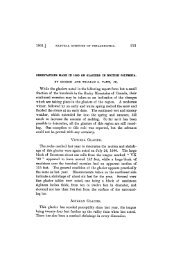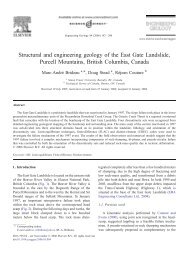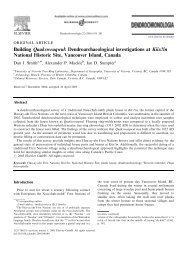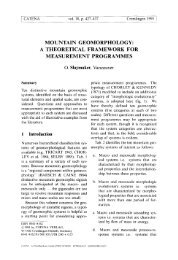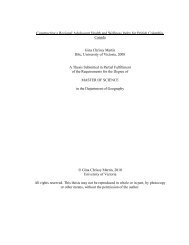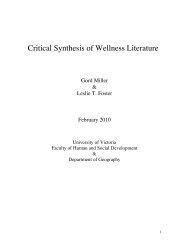Sustainable Food Production, Consumption, and the Generation of
Sustainable Food Production, Consumption, and the Generation of
Sustainable Food Production, Consumption, and the Generation of
Create successful ePaper yourself
Turn your PDF publications into a flip-book with our unique Google optimized e-Paper software.
have implications for environmental policy. Policies aimed at changing consumer awareness <strong>of</strong><br />
<strong>and</strong> attitudes towards <strong>the</strong> environmental impact <strong>of</strong> consumption are becoming more prevalent in<br />
Canada’s waste management goals.<br />
The current over-consumption patterns in many industrialized countries coupled with<br />
industry’s production <strong>of</strong> one way packaging has created an urgency to adopt more ecologically<br />
conscious consumerism. In 1988, a model <strong>of</strong> ecologically conscious consumer behaviour was<br />
developed in which personality variables <strong>and</strong> environmental attitudes were used to predict<br />
ecologically responsible consumption patterns (Schwepker & Cornwall, 1991). Ebrero et al.<br />
(1999) have defined this model as <strong>the</strong> purchase <strong>of</strong> products that benefit or cause less harm to <strong>the</strong><br />
environment than do more conventional consumer goods. The analysis <strong>of</strong> consumption patterns<br />
that focus on packaging is a particularly important issue in <strong>the</strong> recent literature. Biswas et al.<br />
(2000) found that waste recycling behaviour as well as ‘recycling shopping behaviour’<br />
(purchasing products that have limited or recyclable packaging) were significantly affected by<br />
attitudes towards recycling. This study also revealed <strong>the</strong> significance <strong>of</strong> <strong>the</strong> path from waste<br />
recycling behaviour to recycling shopping behaviour demonstrating a potential affect <strong>of</strong><br />
recycling behaviour on o<strong>the</strong>r related behaviours such as shopping for recyclables. These<br />
behaviours are directly related, in that consumers purchase <strong>the</strong> product because it has a particular<br />
environmental benefit (e.g., <strong>the</strong> products packaging is recyclable) <strong>and</strong> can later choose to recycle<br />
<strong>the</strong> package (Ebrero et al., 1999). As Berger (1997) suggests, recycling may be an initial step in<br />
adopting o<strong>the</strong>r related behaviours.<br />
Attempts have also been made to predict environmentally friendly behaviour <strong>and</strong> in<br />
particular recycling behaviour from socio-demographic variables (Ebrero & Vining, 1990; Bratt,<br />
1999; Ebrero & Vining, 2001). This research however, has produced conflicting results. In<br />
some studies, socio-demographic variables have not been shown to be related to recycling<br />
behaviour (Derkson & Gartrell, 1993); whereas in o<strong>the</strong>rs pro recycling behaviour has been<br />
associated with being young, female, liberal, highly educated, wealthy <strong>and</strong> from urban residence<br />
(Mohai, 1991; Steel, 1996; Bratt, 1999; Ebrero et al., 1999). Despite some consistency within<br />
<strong>the</strong> research, marketing researchers have found that to identify or predict environmentally<br />
friendly behaviour from demographic variables was unreliable (Minton & Rose, 1997).<br />
Consumers can contribute to waste prevention by prolonging <strong>the</strong> use <strong>of</strong> products <strong>and</strong> by<br />
dem<strong>and</strong>ing products <strong>and</strong> packaging that are recyclable <strong>and</strong>/or have a low waste <strong>and</strong> a high<br />
recycling content (Thogersen, 1997). Consumers can also contribute to waste minimization in a<br />
25




